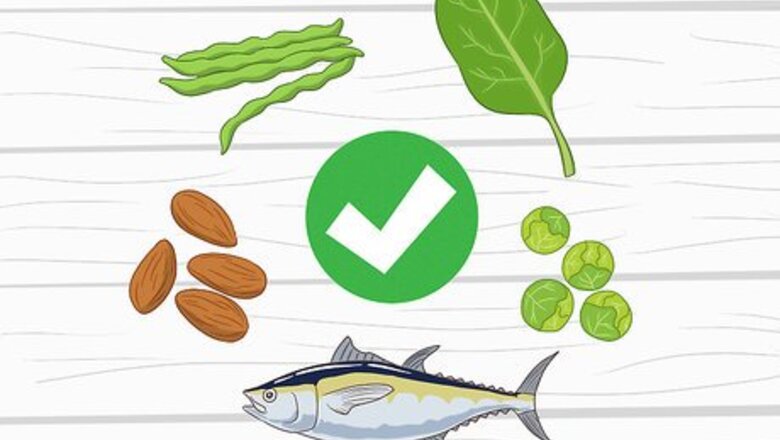
views
Using Natural Remedies
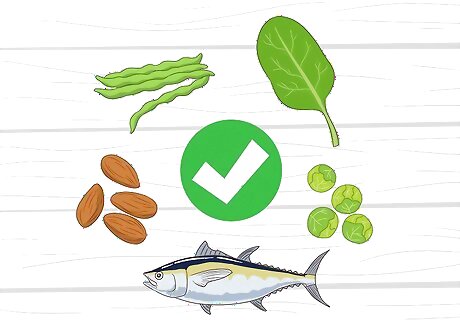
Eat a healthy diet rich in vegetables to help your body heal. Load up on organic fruits and vegetables. Dark leafy greens (such as spinach and kale), cruciferous vegetables (such as broccoli and Brussels sprouts), legumes (such as beans, peas, and lentils), and nuts and seeds (such as almonds, chia seeds, and flax seeds) are all healthy choices. Make sure to also incorporate sources of healthy fat, such as oily fish (like tuna and mackerel). A nutritious, well-balanced diet can promote healing, boost your immune system, and generally help your body function as well as possible. A plant-based diet, in particular, may help regulate the production of hormones that affect reproductive health.
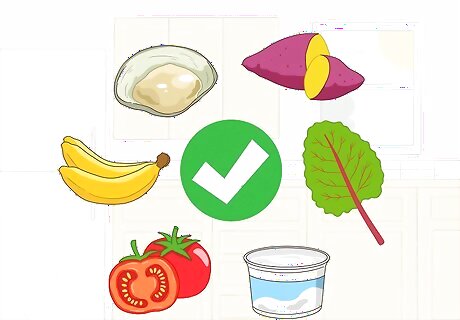
Incorporate potassium-rich foods into your diet. Some proponents of natural medicine believe that ovarian cysts can be a result of potassium deficiency and that eating more potassium may help heal and prevent cysts. Good sources of dietary potassium include sweet potatoes, beet greens, yogurt, tomatoes, bananas, and many types of seafood (such as clams, tuna, and halibut). Most people can benefit from incorporating more potassium into their diet, but consuming too much potassium can also negatively affect your health. Talk to your doctor about whether you are getting a healthy amount of potassium from your diet. The average adult should get around 4,700 mg of potassium from their diet each day. Ask your doctor if this is an appropriate dietary goal for you.
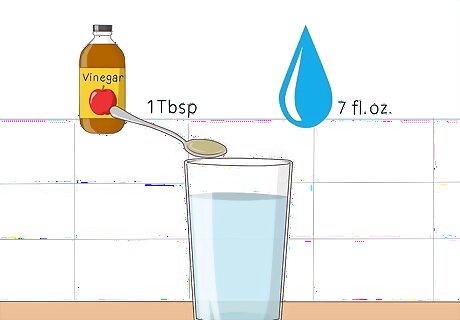
Drink a small amount of apple cider vinegar daily. Mix 1 tablespoon (15 mL) of apple cider vinegar with 7 fluid ounces (210 mL) of water and drink it each day after a meal. There are no evidence-based studies that show apple cider vinegar has an effect on ovarian cyst size. However, one small study showed that consuming a small amount of ACV each day may relieve some symptoms of polycystic ovary syndrome (PCOS). Apple cider vinegar may provide some health benefits, such as helping to regulate blood sugar and facilitating weight loss. Like any dietary supplement, however, it can be harmful if you take too much of it. Too much ACV can damage your teeth, and it may also overwork your kidneys, especially if you have chronic kidney disease. Limit your intake of ACV to no more than 1 tablespoon (15 mL) to 2 tablespoons (30 mL) unless a doctor or dietitian advises you otherwise. Rinse your mouth with water after drinking ACV to minimize damage to your teeth.
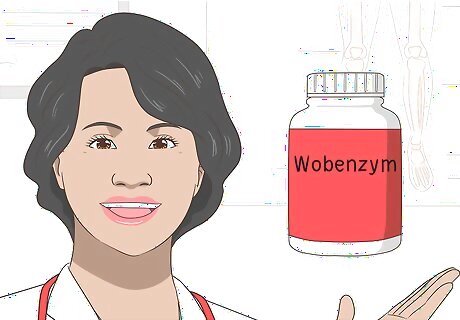
Look into systemic enzyme therapy. Talk to your doctor about taking an enzyme supplement, such as Univase Forte or Wobenzym. Some alternative medicine specialists believe that systemic enzyme supplements may help reduce inflammation and promote the breakdown of excess or abnormal tissues, like those found in some types of ovarian cysts. There has been little scientific research on the effectiveness of oral systemic enzyme supplements for treating any type of medical condition. Systemic enzyme therapy is likely safe, but there is no strong evidence that it is actually helpful for shrinking ovarian cysts.
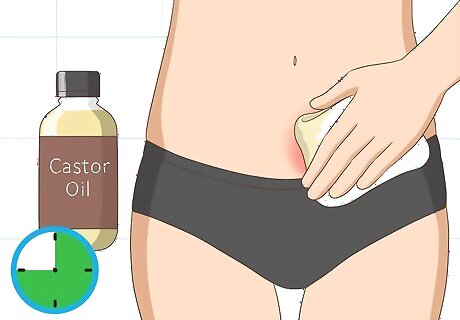
Put a castor oil pack over the affected ovary for 45-60 minutes daily. Soak a piece of clean cloth in castor oil and place it on your abdomen over the cyst. If you wish, you can gently warm the pack by placing a sheet of plastic over the cloth and placing a microwaveable heating pad on top of the plastic. Some natural medicine proponents claim that castor oil applied to the skin may promote better blood circulation and healing of the organs in the area where the oil is applied, including the ovaries. Once you’re done using the pack, you can clean the castor oil off your skin with a mixture of water and baking soda. Do not use castor oil while you are pregnant or nursing, since it may not be safe for the fetus or baby. Some natural healthcare practitioners also caution against using castor oil packs during your period, since it is believed to increase blood flow. There is no scientific evidence to support castor oil as a remedy for ovarian cysts. However, even if the castor oil pack does not help shrink your cysts, it may still provide some comfort if you are experiencing pain.
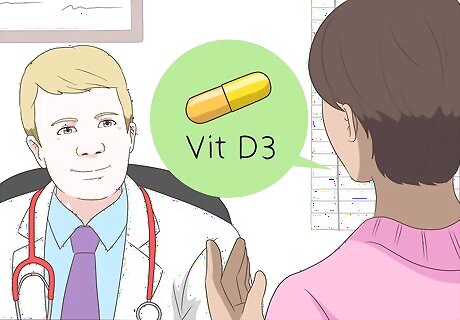
Talk to your doctor about taking vitamin supplements. Some natural medicine practitioners advise using vitamin supplements, such as B-complex and D3 vitamins, to help treat and prevent ovarian cysts. Before taking any new vitamins supplements, talk to your doctor about whether you are getting enough of these vitamins and minerals from your diet. They may order lab tests to find out if you have any vitamin or mineral deficiencies. There is not much research on the effectiveness of vitamin supplements in the treatment of ovarian cysts, but it is possible that certain vitamins and minerals may improve your overall reproductive health. Vitamin D, in particular, is important for keeping your immune system healthy, reducing inflammation in your cells, and helping your body absorb calcium. Vitamin D supplements may also help relieve some of the symptoms of polycystic ovary syndrome (PCOS). However, the studies that looked at these effects were small and there is no evidence that taking vitamin D can treat or prevent any disease.
Getting Medical Treatment
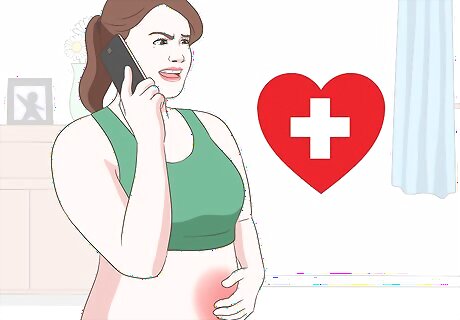
See your doctor if you have symptoms of an ovarian cyst. Schedule an appointment with your doctor if you experience symptoms such as dull or sharp pelvic pain, persistent feelings of fullness or heaviness in your lower abdomen, or abdominal bloating. Your doctor can determine whether or not these symptoms are being caused by ovarian cysts and work with you to develop an appropriate treatment plan. The etiology, or cause, of the symptoms is especially important since this can indicate whether or not you have a medical condition that requires urgent medical care or a benign cyst. Go to the emergency room if you have serious symptoms such as severe abdominal or pelvic pain that comes on suddenly, or pain accompanied by fever, nausea, or vomiting. These can be signs of a serious complication, such as a twisted ovary or a ruptured cyst. Your doctor may perform a variety of diagnostic tests, such as ultrasounds and blood tests.
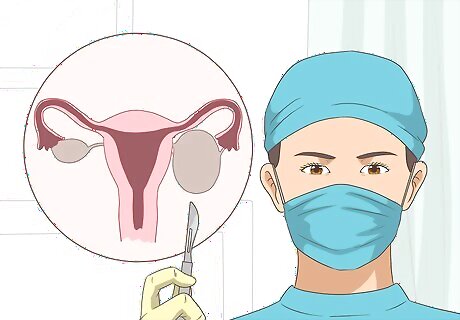
Discuss surgery to remove large, painful, or complicated cysts. If tests show that your cysts are small and benign, your doctor will probably recommend “watchful waiting,” with regular checkups to see if the cysts go away on their own. In some situations, however, they may recommend more aggressive treatments, such as surgery to remove the cysts or the affected ovary. This may be necessary if you have 1 or more cysts that: Are large or growing Do not resolve on their own after 2-3 menstrual cycles Cause pain or other symptoms Show signs of being cancerous
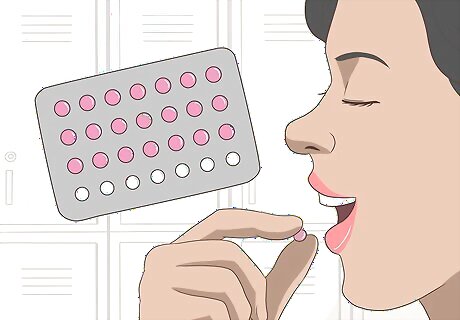
Ask about using hormone treatments to prevent future cysts. Hormonal medications such as birth control pills can help keep cysts from forming by preventing ovulation. If you are prone to developing ovarian cysts during ovulation, this may be a good option for you. Ovarian cysts form as a result of your ovaries' activity. When you're taking birth control, it shuts down that activity, so new cysts can't form. While the pill can help prevent new cysts from forming, it can’t shrink or dissolve cysts that are already present.















Comments
0 comment